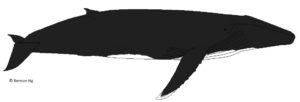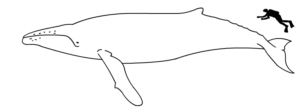Humpback Whale
In recent years, the Humpback Whale (Megaptera Novaeangliae), has become a more of a tourist, whale watching treat in BC waters. As a boater, quite often the first thing noticed on the water is the Humpback blow as they surface to take a breath, or their tail as they dive down. The many years of hunting these whales put them on the Species At Risk Act (SARA) endangered list. With conservation efforts, their numbers are increasing slowly. They are still listed as threatened. Of the whales and dolphins of BC, in recent years, Humpback whales have become the second most researched whale.
Food for Humpback Whales is primarily krill, a miniature version of prawns, and small fish. These are baleen whales, a type of filter in their mouth rather than teeth. They lunge or gulp a huge amount of water and fish expanding their throat which has special pleats for this purpose. As they close their large mouth, they force the water out through the baleen filter and swallow the remaining meal. It’s an amazing sight to watch since quite frequently there is more than one whale coordinating the corralling of fish or krill by blowing bubbles, known as a bubble net.
Usually relatively slow moving, Humpback Whales can pick up the pace if they want to. These spectacular whales need extra speed and strength to be able to hurl their enormous, semi-trailer size body entirely out of the water. This is known as a breach and quite often the whale belly flop lands with a thunderous crash that can sound like an explosion. Breaching whales give whale watchers a great view and appreciation of the size of these animals.
Humpback Whale (Megaptera Novaeangliae) Specifics:
Length:
up to 17 m (55 ft)
Weight:
up to 40,000 kg (88,000 lbs)
Colour:
Dark grey to black body
Occasional white patches on body
Frequently white patches on tail and pectoral flipper
Features:
Broad head with bumps or knobs
Large mouth hinged just below the eye
Barnacles often on body, flippers and tail
Small dorsal fin, (the hump) 2/3 of way down back
Large, up to 1/3 length of body, pectoral flipper
Huge tail flukes – no two are the same in appearance or colour
Click on Cetacean Species in list below:




